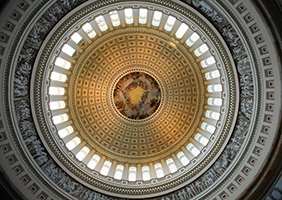Newsroom
NAFCU voices support for CDFI, CDRLF funding, cautions against postal banking
 NAFCU's Brad Thaler again shared credit union priorities with House leadership ahead of its consideration of a fiscal year 2021 spending package – which includes the Financial Services and General Government (FSGG) bill and 11 other appropriations bills. The FY2021 FSGG, if approved as is, includes $273.5 million for the Treasury's Community Development Financial Institutions (CDFI) Fund and $2 million for the NCUA's Community Development Revolving Loan Fund (CDRLF).
NAFCU's Brad Thaler again shared credit union priorities with House leadership ahead of its consideration of a fiscal year 2021 spending package – which includes the Financial Services and General Government (FSGG) bill and 11 other appropriations bills. The FY2021 FSGG, if approved as is, includes $273.5 million for the Treasury's Community Development Financial Institutions (CDFI) Fund and $2 million for the NCUA's Community Development Revolving Loan Fund (CDRLF).
“NAFCU thanks you for your past support for the CDFI Fund and the CDRLF, and we would like to express our support of additional funding for these programs,” wrote Thaler, NAFCU’s vice president of legislative affairs.
Funding for the CDFI Fund is slightly lower than what was allocated in the House version of the FY2020 FSGG bill, but above the final enacted FY2020 amount. The CDRLF money is on par with last year. In the letter sent yesterday, Thaler reiterated NAFCU’s call for further funding for these programs, which are used by credit unions to support low-income communities. NAFCU wrote the subcommittee ahead of its bill markup to advocate for more funding for these programs, which are used by credit unions to support low-income communities.
The House-passed HEROES Act's inclusion of an additional $1 billion in emergency funding for the CDFI Fund that "would allow more credit unions to access monies to provide specific programs to help their members," Thaler wrote and urged Congress to include emergency supplemental appropriations for the CDFI and the CDRLF in any final Phase 4 relief bill.
For the CDRLF, Thaler cited NCUA Board Member Todd Harper's request for $10 million more for grants this year to ensure credit unions have the proper policies and infrastructure in place to address work-from-home and social distancing measures amid the coronavirus pandemic.
Thaler also highlighted how the Small Business Administration’s (SBA) paycheck protection program serves as proof that the SBA’s programs play a key role for small business lenders and asked that Congress ensure the SBA’s 7(a) and 504 lending programs get the funding they need for FY2021.
In addition, Thaler expressed NAFCU’s opposition of any inclusion of a proposed amendment to create a pilot program for postal banking.
“The United States Postal Service (USPS) was established to provide letter, parcel and package delivery services to the country, and an expanded foray into financial services would be both beyond these powers and add a responsibility that the postal service has no expertise in,” wrote Thaler. “NAFCU strongly supports the important core work of the USPS which credit unions across the nation and of all sizes use to communicate with their members, to send statements, to receive payments, and to market new products or services to their members.
“For these reasons, credit unions are committed to identifying long-term solutions to ensure an efficient, self-sustaining, and affordable U.S. postal system,” concluded Thaler. “However, postal banking is not one of those solutions as it is no panacea to the financial challenges of the USPS.”
NAFCU will continue to monitor the bill as it progresses through Congress and will continue to advocate for increased funding for important programs that allow credit unions to better serve low-income communities.
Share This
Related Resources
Add to Calendar 2024-06-26 14:00:00 2024-06-26 14:00:00 Gallagher Executive Compensation and Benefits Survey About the Webinar The webinar will share trends in executive pay increases, annual bonuses, and nonqualified benefit plans. Learn how to use the data charts as well as make this data actionable in order to improve your retention strategy. You’ll hear directly from the survey project manager on how to maximize the data points to gain a competitive edge in the market. Key findings on: Total compensation by asset size Nonqualified benefit plans Bonus targets and metrics Prerequisites Demographics Board expenses Watch On-Demand Web NAFCU digital@nafcu.org America/New_York public
Gallagher Executive Compensation and Benefits Survey
preferred partner
Gallagher
Webinar
AI in Action: Redefining Disaster Preparedness and Financial Security
Strategy
preferred partner
Allied Solutions
Blog Post
Add to Calendar 2024-06-21 09:00:00 2024-06-21 09:00:00 2024 Mid-Year Fraud Review Listen On: Key Takeaways: [01:16] Check fraud continues to be rampant across the country. Card fraud is affecting everyone. [04:31] Counterfeit US passport cards are just another new toolbox in the bad actors’ toolbox. [07:21] Blocking the fallback is the only way to defeat counterfeit cards. [11:17] The best way is constant education to your members in as many channels as you can. [13:02] We are still seeing overdraft lawsuits. Make sure the programming you have at your credit union matches what you have displayed for the members. Web NAFCU digital@nafcu.org America/New_York public
2024 Mid-Year Fraud Review
Strategy & Growth, Consumer Lending
preferred partner
Allied Solutions
Podcast
Get daily updates.
Subscribe to NAFCU today.
